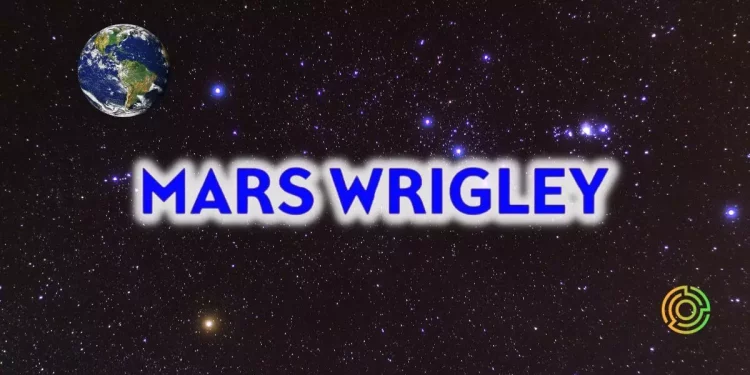Wrigley, owned by Mars, has filed a trademark application for “Juicyverse” to enter the NFT and metaverse space. The application includes provision for virtual confectionery, candies, music, and avatars. This article discusses Wrigley’s move and other similar trademark applications filed in recent years.
Wrigley, the American chewing gum company, filed a trademark application for “Juicyverse” with the United States Patent and Trademark Office (USPTO).
Wrigley has filed a new trademark application for JUICYVERSE
The application claims plans for:
▶️ NFTs + NFT-Backed Media
▶️ Virtual and Physical Candy
▶️ NFT + Crypto-Collectible Sharing Software
…and more!#NFTs #Metaverse #Web3 #MetaverseNFT #Wrigleys #Crypto #NFT pic.twitter.com/oY36WwtPPv— Mike Kondoudis (@KondoudisLaw) March 29, 2023
The move is part of the company’s plan to enter the realm of non-fungible tokens (NFTs) and the metaverse.
On March 24, 2023, a trademark application was submitted indicating that the company plans to provide downloadable picture files containing authenticated NFT images of artwork, confectionery, candy, or snacks.
Additionally, the application covers virtual confectionery, candies, music, and avatars that can be utilized online or in virtual settings.
Wrigley’s move into the NFT and metaverse space is not surprising, considering the increasing popularity of Web3 technologies.
The metaverse is a virtual world where users can interact with each other and digital objects in real time, and NFTs are unique digital assets that can be bought and sold on blockchain networks.
What is “Juicyverse”?
“Juicyverse” is the trademark application filed by Wrigley with the USPTO to enter the world of non-fungible tokens (NFTs) and the metaverse. The application includes provision for virtual confectionery, candies, music, and avatars.
Wrigley’s Plan for NFTs and Metaverse
Wrigley’s plan is to offer downloaded picture files, including images of artwork, confectionery, candy, or snacks authenticated by NFTs.
Furthermore, the trademark application includes a reference to offering virtual confectionery, candies, music, and avatars that can be utilized either online or in virtual settings.
Mars’ Previous Trademark Applications for NFTs and Metaverse
In June 2022, Mars, the company that owns Wrigley, filed trademark applications for its M&M’s and Snickers brands, with the aim of entering the NFT and metaverse realm.
Other Trademark Applications for NFTs and Metaverse
Several other brands have filed trademark applications for NFTs and the metaverse in recent years. For instance, Hershey’s entered the metaverse with “Hersheyverse” in December 2022, where users could complete quests and learn about sweet holiday traditions.
Similarly, Coca-Cola filed a trademark application for “FriendshipBot” in August 2022, which could create a virtual friendship with the brand.
Benefits of NFTs and Metaverse for Brands
Entering the NFT and metaverse space provides brands with an opportunity to engage with their customers in new and innovative ways. It allows them to create unique digital assets that can be traded and sold on blockchain networks.
Brands can also create virtual experiences that align with their brand values and offer new revenue streams.
Challenges of NFTs and Metaverse for Brands
While NFTs and the metaverse present exciting opportunities for brands, they also come with challenges. One of the significant challenges is to stand out in an increasingly crowded market.
With several brands entering the space, it’s essential to create unique and innovative experiences that resonate with customers.
Legal Issues in NFTs and Metaverse
The legal framework around NFTs and the metaverse is still evolving, and several legal issues need to be addressed. For instance, there is a need for clarity around intellectual property rights, taxation, and liability issues.
Brands need to be aware of these legal issues before entering the space.
Impact of NFTs and Metaverse on Advertising
NFTs and the metaverse have the potential to transform the advertising industry. It allows brands to create immersive and engaging experiences that go beyond traditional advertising channels.
However, it also requires brands to approach advertising differently and create experiences that align with the customer’s values and interests.
Future of NFTs and Metaverse
NFTs and the metaverse are still in their early stages, and their future is uncertain. However, it’s clear that they have the potential to revolutionize how brands engage with their customers.
Brands that can create unique and innovative experiences that align with their values and interests are likely to succeed in this space.
Conclusion
Wrigley’s move to file a trademark application for “Juicyverse” is an indication of the growing interest in NFTs and the metaverse among brands.
While there are challenges and legal issues to be addressed, the potential benefits for brands are significant.
As the space continues to evolve, it will be interesting to see how brands use NFTs and the metaverse to engage with their customers in new and innovative ways.
Follow us on our social networks and keep up with everything in the Metaverse!
Twitter Linkedin Facebook Telegram Instagram Google News












































